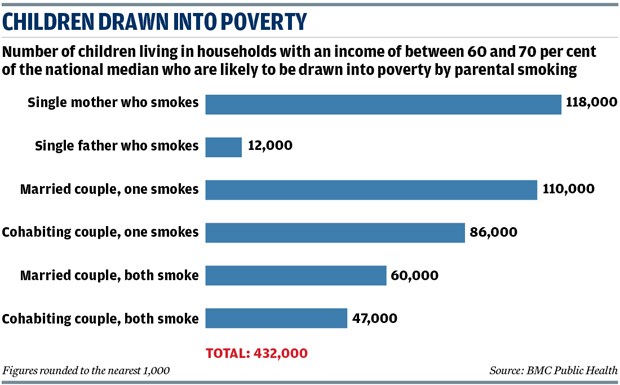Research Report: Parental Smoking and Child Poverty in the UK: An Analysis of National Survey Data
Charlotte Goddard
Monday, June 22, 2015
Authors: Charmaine Belvin, John Britton, John Holmes and Tessa Langley, University of Nottingham, UK Centre for Tobacco and Alcohol Studies, University of Sheffield
Published by: BMC Public Health, May 2015

SUMMARY
In 2011, government figures showed some 2.3 million children in the UK - that's 17 per cent of all UK children - were living in relative poverty, defined at less than 60 per cent of the median household income. Given the government's target of abolishing child poverty by 2020 looks unlikely to be met, the study authors wanted to identify avoidable factors that contribute to child poverty.
Combining findings from several national surveys, such as the Office for National Statistics' (ONS) 2012 Opinions and Lifestyle Survey, the report authors set out to estimate the number of children living in poor households containing smokers and the amount of money spent on tobacco in these households.
The average weekly spend of smoking households on tobacco was calculated using the average number of cigarettes smoked by different demographic groups established by the ONS survey, combined with information from the Tobacco Manufacturers' Association on average prices.
They used this information to work out the number of children drawn into poverty if expenditure on smoking is extracted from household income - in other words, how many children live in families where income is above the 60 per cent median, but by less than the average spend on tobacco.
The research found an estimated 1.1 million children were living in poverty with at least one parent who smoked - almost half of all children living in poverty. The researchers estimated a typical woman living in relative poverty smokes 84 cigarettes a week, while a typical man living in relative poverty smokes 91. Average spend worked out at £32 per week for females and £35 a week for males.
The study found three quarters of a million children living in households with an income of between 60 and 70 per cent of the national median income were living with at least one smoker. According to their calculations, all children living in households with incomes in that bracket who have two parents who smoked would be drawn into poverty while half those with one parent who smoked would also cross the poverty line. This means an extra 432,000 children would be classed as living in poverty if the money their parents spent on tobacco was deducted from the household income. In total, the researchers estimate 1.5 million children are living in circumstances of severe financial deprivation which is exacerbated by parental smoking.
IMPLICATIONS FOR PRACTICE
The report authors say that while care must be taken to avoid moralising to a group living with very different challenges to the rest of the population, their findings indicate the government should place a high priority on measures that encourage parents and carers, especially those in low income groups, to give up smoking.
They suggest effective anti-smoking measures can contribute to an improvement in child health not just through removing an unhealthy smoky environment but also through reducing other adverse health effects linked to living in poverty.
The researchers point to past research which has shown that increasing the price of cigarettes is the intervention with the greatest potential to reduce socio-economic disparities in smoking, even though this seems a counter-intuitive move when trying to lift people out of poverty. However, they stress such a move must be coupled with accessible, individual-level smoking cessation support to help counter the effect of price increases on low-income smokers who continue to smoke, as well as measures to reduce the availability of illicit supplies of tobacco.
FURTHER READING
- Tobacco Spending and Children in Low-Income Households, GW Thomson, NA Wilson, D O'Dea, PJ Reid, P Howden-Chapman, University of Otago, Tobacco Control, September 2002. A New Zealand study examining the role of tobacco use in creating financial hardship for low-income households with children.
- Impact of Tobacco Control Interventions on Socioeconomic Inequalities in Smoking: Review of the Evidence, Sarah Hill, Amanda Amos, David Clifford, Stephen Platt, University of Edinburgh, Tobacco Control, September 2013. A literature review examining the impact of tobacco control interventions such as price increases and advertising bans on socioeconomic inequalities in smoking.
- Smoke-free Homes in England: Prevalence, Trends and Validation by Cotinine in Children, M Jarvis, J Mindell, A Gilmore, C Feyerabend, R West, University College London, University of Bath, Tobacco Control. An examination of the prevalence of smoke-free homes in England between 1996 and 2007 and their impact on children's exposure to second-hand smoke.




